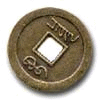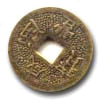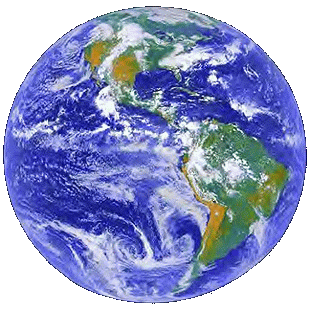|
坤 Hexagram 2
|
|
|
|
|
above: K'un / The Receptive, Earth |
|
|
|
||
|
|
||
|
|
below: K'un / The Receptive, Earth |
|
|
|
||


|
This hexagram is made up of broken lines only. The broken line represents the dark, yielding, receptive primal power of yin. The attribute of the hexagram is devotion; its image is the earth. It is the perfect complement of THE CREATIVE-the complement, not the opposite,1 for the Receptive does not combat the Creative but completes it. It represents nature in contrast to spirit, earth in contrast to heaven, space as against time, the female-maternal as against the male-paternal. However, as applied to human affairs, the principle of this complementary relationship is found not only in the relation between man and woman, but also in that between prince and minister and between father and son. Indeed, even in the individual this duality appears in the coexistence of the spiritual world and the world of the senses. But strictly speaking there is no real dualism here, because there is a clearly defined hierarchic relationship between the two principles. In itself of course the Receptive is just as important as the Creative, but the attribute of devotion defines the place occupied by this primal power in relation to the Creative. For the Receptive must be activated and led by the Creative; then it is productive of good. Only when it abandons this position and tries to stand as an equal side by side with the Creative, does it become evil. The result then is opposition to and struggle against the Creative, which is productive of evil to both. THE JUDGEMENT
The receptive brings about sublime success, THE FOUR fundamental aspects of the Creative (1) - "sublime success, furthering through perseverance" - are also attributed to the Receptive (2). Here, however, the perseverance is more closely defined: it is that of a mare. The Receptive (2) connotes spatial reality in contrast to the spiritual potentiality of the Creative (1). The potential becomes real and the spiritual becomes spatial through a specifically qualifying definition. Thus the qualification, "of a mare," is here added to the idea of perseverance. The horse belongs to earth just as the dragon belongs to heaven. Its tireless roaming over the plains is taken as a symbol of the vast expanse of the earth. This is the symbol chosen because the mare combines the strength and swiftness of the horse with the gentleness and devotion of the cow. |
|
Only because nature in its myriad forms corresponds with the myriad impulses of the Creative (1) can it make these impulses real. Nature's richness lies in its power to nourish all living things; its greatness lies in its power to give them beauty and splendor. Thus it prospers all that lives. It is the Creative (1) that begets things, but they are brought to birth by the Receptive (2). Applied to human affairs, therefore, what the hexagram indicates is action in conformity with the situation. The person in question is not in an independent position, but is acting as an assistant. This means that he must achieve something. It is not his task to try to lead - that would only make him lose the way - but to let himself be led. If he knows how to meet fate with an attitude of acceptance, he is sure to find the right guidance. The superior man lets himself be guided; he does not go ahead blindly, but learns from the situation what is demanded of him and then follows this intimation from fate. Since there is something to be accomplished, we need friends and helpers in the hour of toil and effort, once the ideas to be realized are firmly set. The time of toil and effort is indicated by the west and south, for west and south symbolize the place where the Receptive (2) works for the Creative (1), as nature does in summer and autumn. If in that situation one does not mobilize all one's powers, the work to be accomplished will not be done. Hence to find friends there means to find guidance. But in addition to the time of toil and effort, there is also a time of planning, and for this we need this solitude. The east symbolizes the place where a man receives orders from his master, and the north the place where he reports on what he has done. At that time he must be alone and objective. In this sacred hour he must do without companions, so that the purity of the moment may not be spoiled by factional hates and favoritism. |

|
|
|
THE IMAGE
The earth's condition is receptive devotion. JUST AS there is only one heaven, so too there is only one earth. In the hexagram of heaven the doubling of the trigram implies duration in time, but in the hexagram of earth the doubling connotes the solidity and extension in space by virtue of which the earth is able to carry and preserve all things that live and move upon it. The earth in its devotion carries all things, good and evil, without exception. In the same way the superior man gives to his character breadth, purity, and sustaining power, so that he is able both to support and to bear with people and things. ALL LINES ARE CHANGING !!!
When all the lines are sixes, it means: When nothing but sixes appears, the hexagram of the receptive changes into the hexagram of the creative. By holding fast to what is right, it gains the power of enduring. There is indeed no advance, but neither is there retrogression. 1. [Hexagrams that are opposites in structure are not necessarily opposites in meaning.] |

